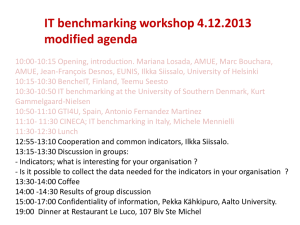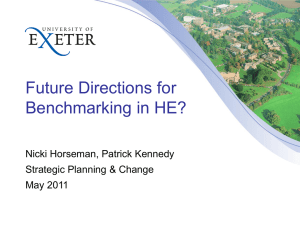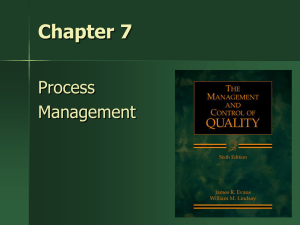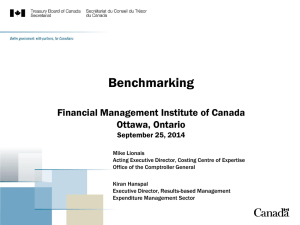Scottish Higher Education Enhancement Committee
advertisement
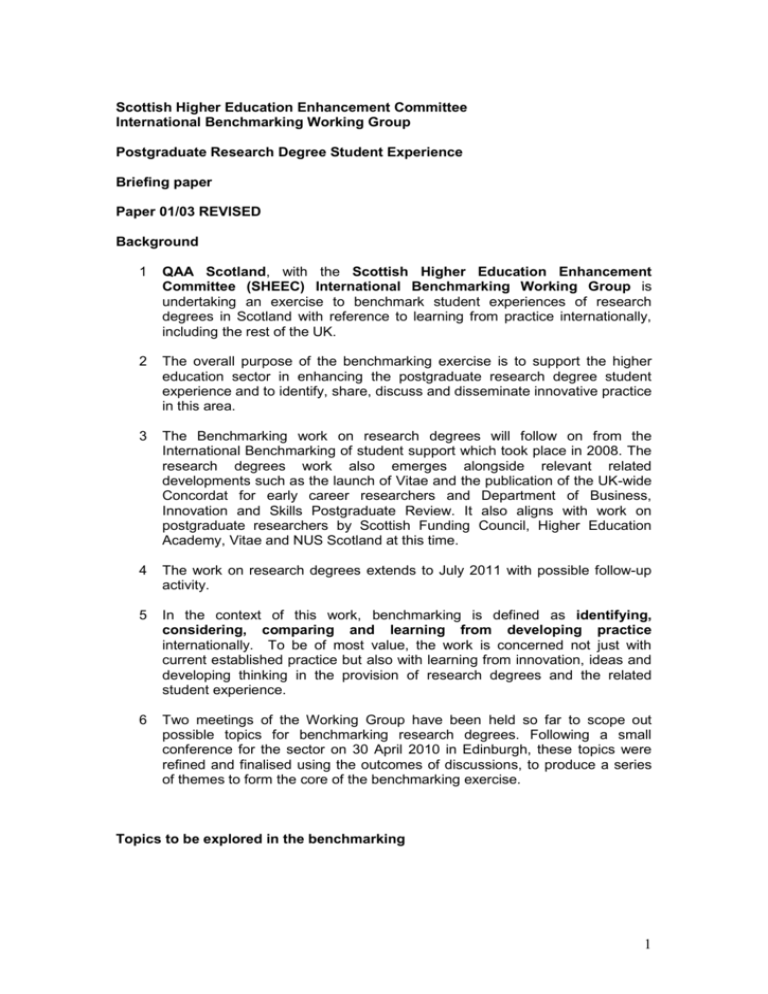
Scottish Higher Education Enhancement Committee International Benchmarking Working Group Postgraduate Research Degree Student Experience Briefing paper Paper 01/03 REVISED Background 1 QAA Scotland, with the Scottish Higher Education Enhancement Committee (SHEEC) International Benchmarking Working Group is undertaking an exercise to benchmark student experiences of research degrees in Scotland with reference to learning from practice internationally, including the rest of the UK. 2 The overall purpose of the benchmarking exercise is to support the higher education sector in enhancing the postgraduate research degree student experience and to identify, share, discuss and disseminate innovative practice in this area. 3 The Benchmarking work on research degrees will follow on from the International Benchmarking of student support which took place in 2008. The research degrees work also emerges alongside relevant related developments such as the launch of Vitae and the publication of the UK-wide Concordat for early career researchers and Department of Business, Innovation and Skills Postgraduate Review. It also aligns with work on postgraduate researchers by Scottish Funding Council, Higher Education Academy, Vitae and NUS Scotland at this time. 4 The work on research degrees extends to July 2011 with possible follow-up activity. 5 In the context of this work, benchmarking is defined as identifying, considering, comparing and learning from developing practice internationally. To be of most value, the work is concerned not just with current established practice but also with learning from innovation, ideas and developing thinking in the provision of research degrees and the related student experience. 6 Two meetings of the Working Group have been held so far to scope out possible topics for benchmarking research degrees. Following a small conference for the sector on 30 April 2010 in Edinburgh, these topics were refined and finalised using the outcomes of discussions, to produce a series of themes to form the core of the benchmarking exercise. Topics to be explored in the benchmarking 1 6 The benchmarking work will focus on practice in key areas as identified in the topics below, although it is acknowledged that there is overlap and linkages between the topics. 12 For each topic, the Group is seeking to identify interesting and developing thinking, initiatives and practice internationally and within Scotland. The benchmarking is not only concerned with innovative practice but also with developing ideas that the sector may find useful to share. 13 For each of the topics, the Group wishes to identify for example, particular examples of practice; the challenges faced in implementation and delivery and the benefits to the student experience. 14 The full range of topics is detailed below with contextual information and issues raised by both the Working Group and the discussion groups at the event on 30 April. A. Student experience – supporting the research degree student International research students 15 The Group agreed that sharing practice in terms of supporting the international student would be highly valuable, given the huge increase recently in the number of international students studying for research degrees in Scotland. For example, The Royal Society reports that in 2004/5 students from outside the UK accounted for 39% of all doctorates. The numbers of non-EU students undertaking Masters Degrees increased in 10 years from 600 in 1994/5 to 2,100 in 2004/5. The quality of the experience of such students in terms of the ‘intellectual climate in which they study and with which they engage is considered a major issue for discussion, as well as the benefits that international students can bring to the intellectual climate and research communities of HEIs in Scotland. Another area to consider is funding for international PhD students, given that Europe is increasingly providing doctoral programmes in English. 16 Key areas of practice to consider are: barriers and support mechanisms for international students; transition programme orientation; induction; use of graduate schools by international students; training; students services. Part-time research students 17 The experience of part-time students is a timely topic given the increasing variation in the type of research students in Scotland therefore is a subtopic the Group are keen to explore. HESA statistics from 1998-2004 highlighted that most part-time students in the UK were in the Russell Group, whereas full-time students were more evenly distributed between the Russell Group and all other HEIs. For example, more research students are more careerfocused and professional and part-time doctorates are becoming a popular choice. The part-time research student experience is considered very different from the traditional full-time PhD experience, mainly due to offcampus and remote learning, irregular, evening and weekend working hours, the difficult of accessing supervisors in these irregular and unconventional hours. 2 The benchmarking exercise will specifically consider international practice in remote working; supervision; integration of part time students; support mechanisms for part time students. B Standards, quality assurance and reviews Professional Doctorates, examination and external examiners, assessment, supervision and supervisors and the challenges of Joint Degrees 18 The Group agreed that assessment, supervision and external examination of PhDs is an area where sharing practice could be beneficial, especially as this varies largely across Europe and internationally. In terms of exploring supervision, consideration should be given to international examples in practice relating to supervisor training and mentoring, programmes in place and the benefits and challenges to staff and students. 19 The ‘new’ forms of PhD are important to pursue - by publication, by practice, joint degrees and professional doctorates. The relative forms of submission of these doctorates, for example by thesis, creative practice, anthology, publication and modes of study such as part-time/full-time study and by workbased learning are also key areas to explore when benchmarking international practice. 20 Of most interest to the group was benchmarking practice which relates to the professional doctorate, and specific areas to be considered are: the range and content of professional doctorates; institutional and joint approaches to the professional doctorate; ensuring quality of professional doctorates; and training for professional doctoral candidates. It will also be useful to consider trends internationally and who the key players are. C Developing and supporting critical mass and critical diversity Collaboration and Graduate Schools, Doctoral training Centres; Inter- and intranational graduate schools, variations and models of graduate schools 21 The concept of graduate schools and research pooling, collaboration and other joint projects across institutions (and perhaps beyond, with the involvement of external business or industry) has been identified as a key area to explore practice. It is argued that pooling creates a unique opportunity for graduate training, supervision and support, with the added advantage of accessing experts and peers across all partner institutions. 22 Benchmarking practice in relation to graduate schools and interdisciplinary collaboration and how such developments might support the mass and diversity of research students includes: Examples of subject specific graduate school examples of international collaboration at practical and regulatory levels graduate school structures which support the PGR experience Examples of purpose-built graduate schools 3 D Supporting the development of postgraduate skills and attributes Postgraduates who teach 23 The Group acknowledged the concepts and practice around the recognition of postgraduate students as staff (rather than students), and in particular the growing attention being paid to ‘postgraduates who teach’. The status of postgraduates who teach, and more importantly, their multiple identities within the academic community, department, faculty or institution is an area for consideration in relation to international examples. Public engagement, entrepreneurship, leadership and management and professional skills 24 Professional skills are considered by the Group as useful to the benchmarking exercise in order to share and learn from international practice. There was interest in collecting case studies from LERU, Australia, Scandinavia and United States. A broader postgraduate researcher skills agenda should be explored, including international examples of how institutions accommodate and support: E PGRs as teachers (communication skills especially) Public engagement Enterprise Leadership and Management Interdisciplinary engagement Broadening the postgraduate experience Internationalising the research degree experience 25 A more overarching issue is the international experience of all research students (UK or non-UK) and the internationalisation of research degree programmes in Scottish HEIs. This is considered an area for development by the Group, in terms of extent of Scottish research students’ global outlook during their degree, and in their forthcoming research careers. In this sense, it is an important topic to benchmark. Particular areas to identify practice are: Overcoming barriers to mobility (including through different mobility schemes, e.g. Erasmus Mundus) Increasing competitiveness of students International approaches to research degrees Examples of successful collaboration Ways in which research degrees can be made into an international experience. Programme of work to date: 26 Thus far the programme of work has involved: 4 two meetings of the Working Group to scope out the area of work and to agree an overall scope and approach to the benchmarking in addition to the following activities: one sector wide event to further clarify and confirm the topics for benchmarking recruitment of a consultant, Dr Avril Manners, to undertake the benchmarking exercise initiating establishment of a network of practitioners from across the UK and internationally and creating web pages on the Enhancement Themes web-site to publicise and disseminate the work in the sector. Next steps 27 Working with the Group and QAA Officers, the consultant, Avril Manners, will undertake the benchmarking exercise, collecting case studies and examples of international practice in the areas discussed above. 28 A series of meetings and events will be planned out for the next academic year, 2010-11. 29 A national conference will be held in 2011 to disseminate the work to the sector. 5
